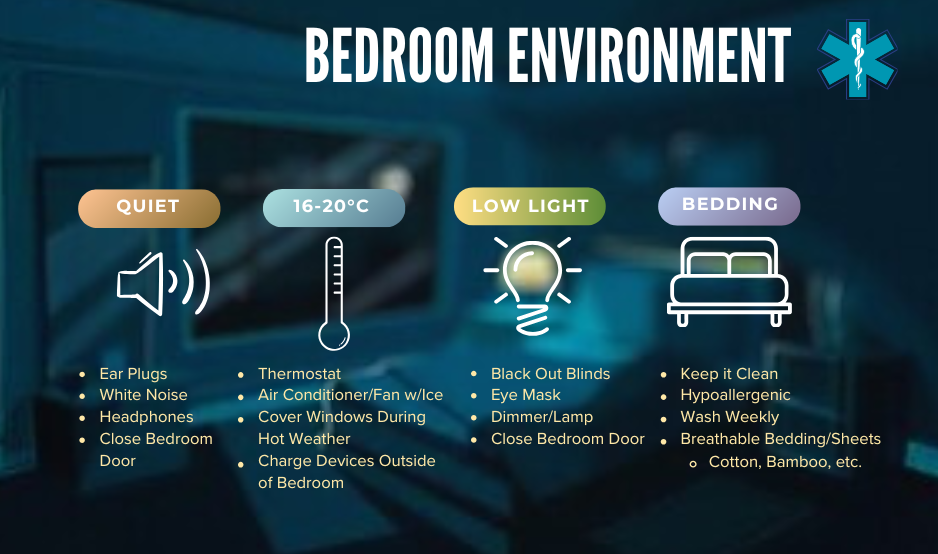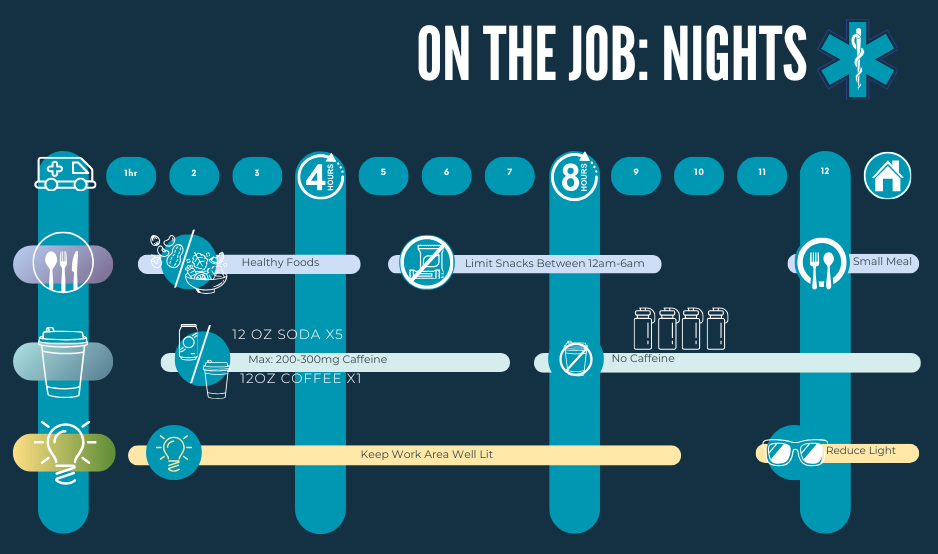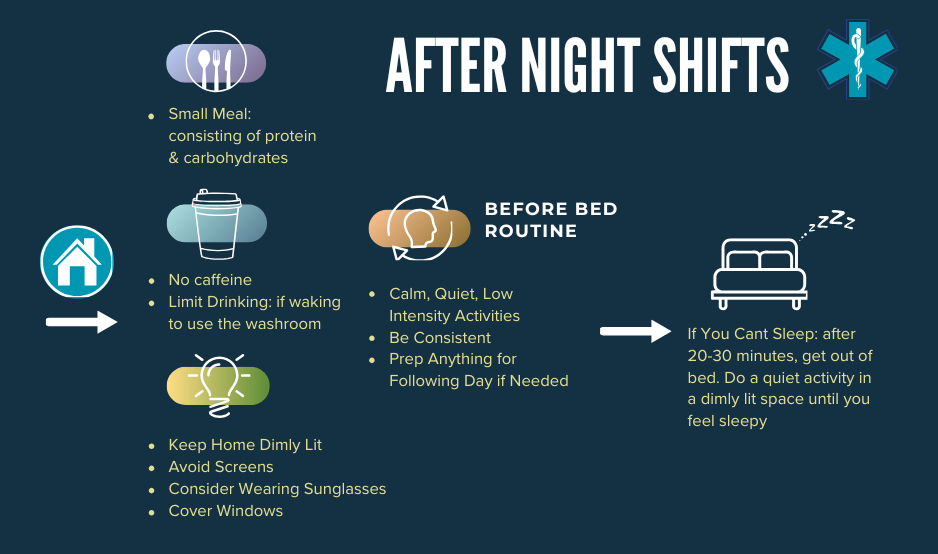Impacts of Shift Work Part 2: Essential Tips for Better Rest During Shift Work
Impacts of Shift Work Part 2: Essential Tips for Better Rest During Shift Work
Part 1 described the importance of sleep and impact of shift work on sleep for paramedics. Paramedics play a vital role in emergency care, however, the irregularity of these shifts can mess up our natural sleep patterns. Managing this complex issue extends beyond the standard advice of getting 8 hours of sleep, and shift workers have some unique additional challenges.
Good sleep is important for health, wellbeing, and job performance. On and off the job, it is critical that we all get enough quality rest to stay sharp and effective when it matters most. The following will examine what each of us can do to get better sleep including specific advice for paramedics and shift working professions.
Learn more about sleep
The Ideal Bedroom: What You Can Do to Help You Sleep

Many of us are aware that our ability to sleep is impacted by our surroundings and that noisy, bright places aren’t ideal, but there are many environmental factors at play.
1. Light: Exposure makes people feel more awake and can add to the time it takes to get to sleep even an hour before bed.
- Minimize light exposure an hour before bed: sunlight and artificial (including screens)
- Low and blue light settings on devices can help but do still impact sleep
- Use blackout blinds or an eye mask to block out light when sleeping
Where else is light getting through? A towel under the door, cardboard over windows, and strategically arranged furniture can help reduce light exposure in bed.
2. Sound: Sounds above 35 decibels (the volume of a whisper), can impact sleep.
- Consider using earplugs, a white noise machine, or calming music to mask noise, especially if you need to sleep during the day.
Living with Others: How might household routines be adjusted to minimize noise when others need to sleep? Is there a different room that would have less noise during the day? Could louder chores/activities be done at a different time/place? Heavy furniture against walls the noise is traveling through can help minimize the effects.
3. Temperature: Your inner body temperature must lower for sleep. A cooler room, between 18-22°C (64-72°F), is ideal.
- Avoid stimulating activities like intense exercise before bed
- Calming warm activities (i.e., warm baths/drink) can help the body cool itself
- If you are too warm to sleep: Try cotton, linen, or bamboo bedding, or “cooling towel/blanket”
How to Cool Down a Hot Bedroom: Hot summers can quickly make sleeping uncomfortable for those who don’t have air conditioning.
- Cover windows and keep them closed during the day: aluminum covered cardboard can reflects heat
- Open windows during cooler hours
- Fan Upgrade: place cold water/ice in front of fan to cool air- a short container with a wide base works best (less helpful in humid places)
- Limit use of heat producing appliances- oven, stove, hair dryer, dishwater, water heaters, etc.
4. Scents: Lavender can improve sleep quality, while scents like citrus can be alerting. Consider the smells in your bedroom and how they may be impacting your rest.
For more information on scents and sleep
5. Bedroom Space: A tidy, calm bedroom helps signal the body that it’s time to rest.
- Keep the bed just for sleep (and intimacy) to strengthen this signal
Keep the bedroom clean to reduce stress
6. Air Quality: Dust and allergens can affect sleep. The following can help:
- Use hypoallergenic bedding
- Minimize carpets (can collect allergens)
- Use an air filter/purifier if you have allergies
7. Mattress: Replace every 6-8 years. An old or uncomfortable mattress can cause discomfort and lead to poor sleep quality
Before Bed Routine
Having a consistent routine before bed can signal to the body that it is time to sleep. This is especially important for those with inconsistent schedules. Before going to sleep, prepare for the next day to prevent worrying before bed and engage in low intensity calming activities such as reading.
Time Before Bed | Do | Don’t (Avoid) |
5-6 hours | → Eat normal meals and drink regularly | Consume caffeine/stimulants |
1-2 hours | → Eat light snacks if hungry (protein & carbohydrates) | Eat heavy meals (steak and cream pastas) |
0-1 hour | → Relaxing activities (gentle yoga or walk, reading), reduce light exposure (including screens) | Do heavy exercise (running on a treadmill) |
| ** reduce fluid intake closer to bedtime if you are waking to use the washroom |
For those who have trouble falling asleep, or have difficulty winding down before bed, the following exercises have been shown to help.
Breathing: Help with melatonin production (sleep hormone), promoting relaxation and sleep.
- Controlled breathing: slow deep breaths with one hand on the stomach (should move with your breath), the other on the chest (should not move).
- 4-7-8 Breathing: Breathe in through the nose while counting to 4. Hold for 7 counts, then release through the mouth for 8. Repeat at least four more times
Mindfulness: Can help decrease worry, improving sleep duration and quality.
- Body Scan: (guided or independent) Lie down, hands at sides and take a few deep breaths. Direct attention towards your feet, and as the breath is released move attention to the ankles. Repeat this slowly progressively moving upwards until you reach the head.
- Imagery: Close the eyes and breathe deeply, imagine yourself in a scene that feels calming/relaxing (i.e., favorite place, a breach, etc.). Notice the pleasant details.
Muscle Relaxation: To reduce anxiety, release tension, help with pain relief, and better sleep.
- Military Method: Consciously relax muscles moving from forehead to toes. Take slow deep breaths throughout.
- Progressive Muscle Relaxation: Tense (on inhales) and relax muscles (during exhale). Repeat for different muscle groups throughout the body.
When You Can’t Sleep: After 20-30 minutes, leave the bedroom and engage in a quiet, relaxing activity (reading, listening to a sleep story) in a dimly lit area. Avoid screens.

Technology and Tools
1. Calm App: Soundscapes, sleep stories and meditations to help with sleep, relaxation, and mental health.
2. Headspace App: Music, meditation, before bed wind downs and other audio experiences.
3. SleepSync App: Offers personalized sleep advice and education based on your schedule/routine.
4. Timeshifter App: Provides sleep advice on based on your schedule (when to avoid/use sleep affecting things, i.e., caffeine).
5. REST Device: Designed for dry eyes, this device has potential to help with falling asleep and daily energy management.
6. Melatonin: Supplements may help some fall asleep. Use low doses (1-3 mg) and avoid light exposure to maximize its effects
Shift Workers
Scheduling: Opt for a consistent schedule if possible. Follow a consistent plan for transitions and adjust sleep patterns gradually.
On the Clock: Maintain a well-lit work space, limit caffeine towards the end of your shift and consume smaller, nutritious meals. Be cautious of sleep inertia (temporary performance impacts) after naps.
For more information: Eat, Sleep and be Healthy A Paramedic’s Guide to Healthier Shift Work
Effective Habits
1. Exercise Regularly: Aim for 30 minutes of moderate aerobic exercise daily.
- Even short, light activity daily can improve sleep
2. Napping: Short naps (30 minutes) can increase alertness without impacting your primary rest.
- Longer naps: 2-3 hours in the early afternoon to boost alertness for night shifts.
3. Meals: Maintain a consistent schedule, even during overnight shifts.
- A larger meal when you get up can help you feel awake
- Avoid large meals, sugary foods, and caffeine close to bedtime
By incorporating these strategies, paramedics (and other shift workers) can enhance their sleep quality, better manage the impacts of shift work, and improve their overall well-being.

Conclusion
For health care professionals on shift work, sleep and its impacts are complex. Poor sleep patterns, long term sleep loss, and the related health risks pose significant challenges for those in the field.
Amid ongoing contract discussions with Alberta Health Services (AHS) and the current restructuring of the Alberta health care system, it is uncertain how the field will change in upcoming years. As we continue to explore solutions to this issue, it’s important to prioritize both individual and organizational efforts in supporting healthcare workers. By encouraging a better understanding of sleep health and applying practical measures, we can promote a healthier, more resilient workforce of emergency responders and improve their ability to perform critical duties.
References
Huang, G., Lee, T. Y., Banda, K. J., Pien, L. C., Jen, H. J., Chen, R., Liu, D., Hsiao, S. T. S., & Chou, K. R. (2022). Prevalence of sleep disorders among first responders for medical emergencies: A meta-analysis. Journal of Global Health, 12. https://doi.org/10.7189/JOGH.12.04092
EWI Works offers many services that can improve your quality of life. We have developed several cost-effective remote services to help you transition to remote work. Find out more about our Online Training, Services, and Resources.
Follow us on Twitter, LinkedIn, and Facebook for more updates and offers, or sign up for our newsletter below.

